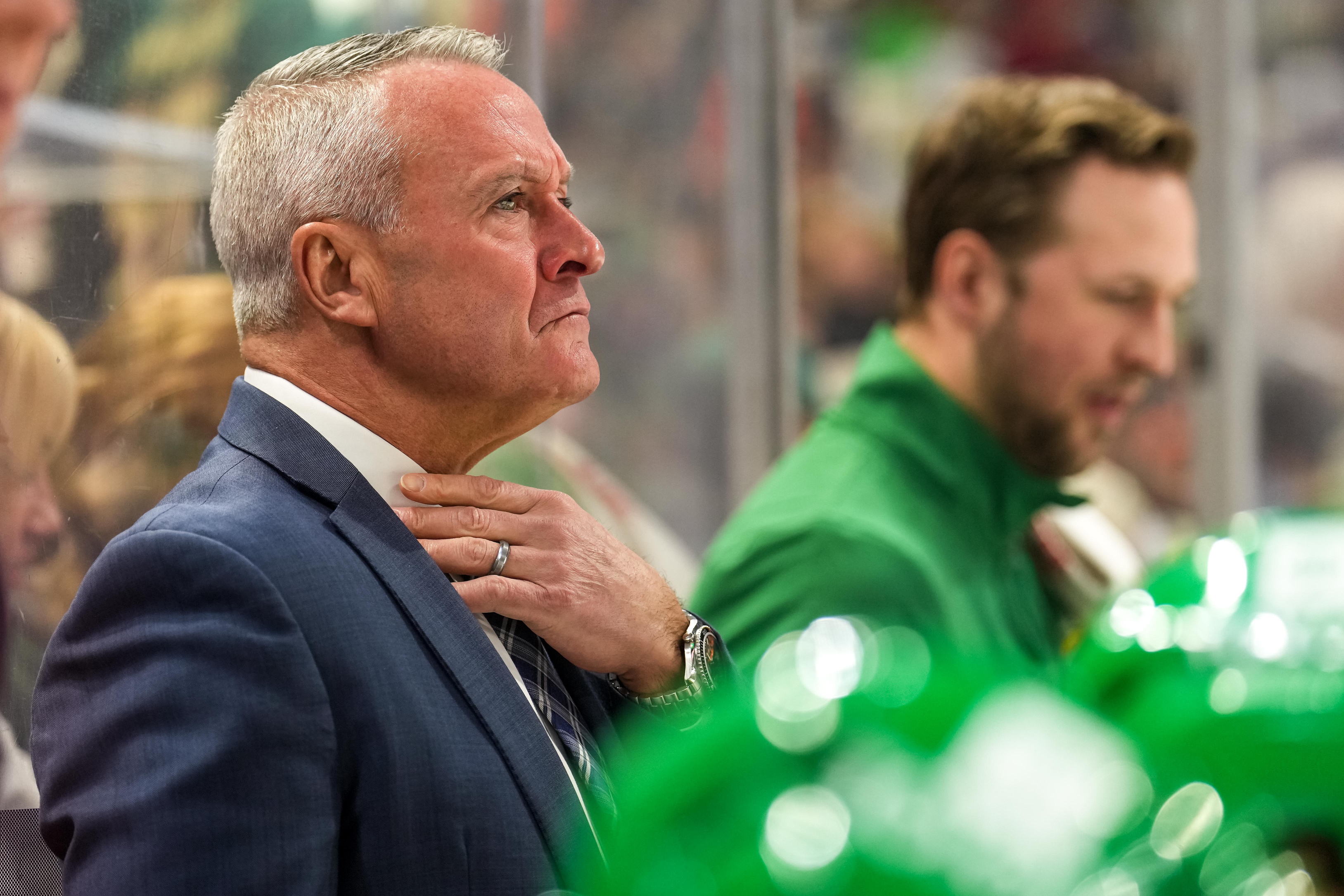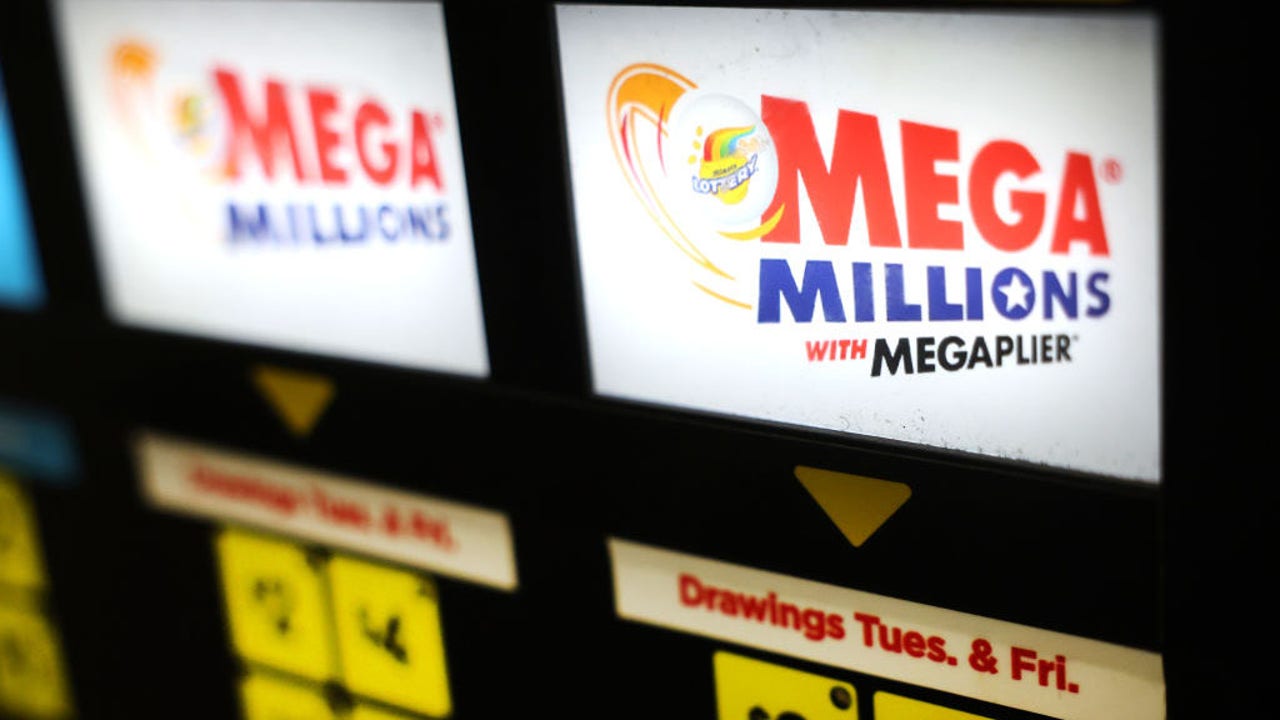It’s shocking how fast things turned, but it’s not tough to see why the Minnesota Wild dismissed head coach Dean Evason and assistant coach Bob Woods on Monday afternoon. After dropping their seventh game in a row, a 4-1 clunker to the Detroit Red Wings, Minnesota now sits at 30th in the league, with just two points separating them from the 31st-place Chicago Blackhawks and four from the dead-last San Jose Sharks.
The Wild are reportedly hiring John Hynes and going for a turnaround, but being seven points out of a playoff spot after Thanksgiving makes the road ahead difficult, even with a new voice. Worse yet, the Wild are a whopping 12 points from third place in the Central Division. That means that if the Wild do go on a run starting tomorrow night, they can only (realistically) claim a Wild Card spot. In that case, they’d face a first-round date with a Western Conference heavyweight like the Stars, Colorado Avalanche, Vegas Golden Knights, or Los Angeles Kings.
“Why bother?” might well be the attitude of a Wild fan base that has seen better versions of this core do worse in the first round of the playoffs. Why not let this team sink? Especially with a prize like Macklin Celebrini at the end of the rainbow for one lucky bad team. So why are the Wild looking to salvage the season?
If any team would get a pass for taking a step back, it would be this Wild team. They’re buckling under nearly $15 million in buyout penalties, severely restricting their team-building ability. While Evason’s seat got too hot for him to stay on as coach, general manager Bill Guerin’s seat is firmly entrenched.
The Wild just promoted Guerin to President of Hockey Operations this past offseason and gave him an extension. With the exception of Paul Fenton’s truly bizarre 14-month run, owner Mr. Craig Leipold has shown tremendous long-term faith in general managers. David Poile stood as GM for Mr. Leipold’s entire run as owner of the Nashville Predators. Chuck Fletcher held his post for nearly a decade, even with little playoff success to show for it.
This is all to say that if Guerin does something drastic to save the Wild’s season in the next short while, it’s not about self-preservation. If it’s not about self-preservation, though, what is it about?
Two words: Number ninety-seven.
What separates the Wild from a rebuilding team? All due respect to remarkably solid players like Jared Spurgeon, Jonas Brodin, and Joel Eriksson Ek, but Kirill Kaprizov is that difference. Despite his well-documented struggles this season and not quite looking like himself, Kaprizov is still an in-his-prime superstar. Getting him back on track represents the only hope of getting the Wild back to their winning ways and is also the biggest reason to wish for them to do so.
This season can’t be fun for Kaprizov. Say what you will about what they’ve done when his Wild get to the playoffs, but all Kaprizov knows is winning. During his first three seasons in Minnesota, the Wild registered a points percentage of .661, or an average of 108 points per 82 games. Dating back to his KHL days, Kaprizov hasn’t missed a postseason since 2015-16, when the 18-year-old was playing for his hometown Mettallurg Novokuznetsk.
Unfortunately, this season is probably the worst time for the Wild to collapse, and it’s because of Kaprizov. The State of Hockey is months away from seeing a large amount of power fall into Kaprizov’s hands. Kaprizov’s No-Move Clause will kick in at the start of the new league year (July 1). Before that point, Minnesota has complete control over what they do with his contract. After July 1, Kaprizov gets the final say.
This means that if, say, the Wild miss the playoffs and Kaprizov becomes unhappy with the situation, he can not only request a trade but dictate which suitors can trade for him. There is potential for him to not only engineer a way out but also depress the market for his services by targeting a single destination.
To be clear, we have no insight into Kaprizov’s mindset or willingness to stay in Minnesota long-term. We aren’t fear-mongering. It’s simply a reality that Minnesota has to account for and hedge against, which they’ve (likely) been doing since this summer. You can read this summer’s extensions to linemates Mats Zuccarello and Ryan Hartman as efforts to keep Kaprizov happy. In naming him an alternate captain, the Wild seemed to attempt to solidify his feeling of ownership over this team.
Making the playoffs is part of that project, even if it means having to offer Evason up as a sacrificial lamb. It’s important to give a taste of success to Kaprizov during these dead cap years in tandem with selling him on the team’s emerging prospect base. Maybe Kaprizov is looking forward to the team’s future to the point where he can be patient without short-term success. But is Guerin going to risk it if he can help it? The answer is obviously “no.”
It’s easy to say that the Wild’s long-term interests are best served with the team staying the course and letting what happens happens. That might mean turning it around for a playoff run, it may include the Wild continuing their Playing Like A Weenie For Celebrini campaign. Still, Guerin is 100% right to fear a potential Kaprizov departure. The biggest reason anyone’s talked about the team for the past three years is because of the star power he commands. He’s been the engine of Minnesota’s recent successes. Without him, the long-term future of the team gets muddied.
Yes, the emergence of Matt Boldy (present struggles notwithstanding), Marco Rossi, and Brock Faber are extremely encouraging. So is having Jesper Wallstedt, Danila Yurov, and Riley Heidt emerging as star prospects behind them. But no one can count on their prospect pool regularly churning out stars. Even so, if all those prospects become impact players, they’re still better off with Kaprizov anchoring and elevating the bunch.
As fruitless as making the playoffs seems as a goal, the point is that the Wild and Guerin almost certainly need Kaprizov for long-term viability. There aren’t many paths to being better in a Kaprizov-less future. And there’s no upside for Guerin to be the person who let Kaprizov and Kevin Fiala get away in the span of three years. If you’re wondering why the Wild would bother to try getting back on track, all you have to do is tap into your existential dread at the thought of what happens after a lost season.
This isn’t to say Evason didn’t have his own problems leading to his dismissal. He couldn’t get Kaprizov or Boldy going offensively this season, his team’s defensive structure and penalty kill collapsed, and this compounded with wretched goaltending. Still, it’s easy to argue that the winningest coach in team history (.639 career points percentage) got a raw deal.
Maybe he did. But at the end of the day, this wasn’t about him or anything he did. It was about the chips the Wild had already pushed into the middle to make the playoffs this year. More importantly, it was about the urgency to go further into “all-in” territory for a postseason berth in a bid to solidify Kaprizov’s future with the team. Agree with it or not, the Wild were always going to head down this path. We’ll now see if it works.

























/cdn.vox-cdn.com/uploads/chorus_asset/file/24924653/236780_Google_AntiTrust_Trial_Custom_Art_CVirginia__0003_1.png)




/cdn.vox-cdn.com/uploads/chorus_asset/file/25672934/Metaphor_Key_Art_Horizontal.png)

